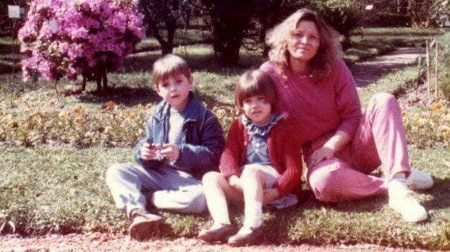Ezequiel Avaro, the son of Cristina Brítez Arce who died in 1992 at the age of 38 at the Sardá Hospital in Buenos Aires when she was more than 40 weeks pregnant, described it as “an exemplary closure of a process” that “will help to take measures of awareness”, the decision made by the Inter-American Court of Human Rights (IDH Court) that condemned Argentina for the death of the woman due to obstetric violence, in an unprecedented ruling in the region.
In the judgment of the case “Brítez Arce and others versus Argentina”, the Inter-American Court considered that Argentina is responsible for “the violation of the rights to life, personal integrity and health” of the woman.
It also held the State responsible for not caring for the rights “to personal integrity, judicial guarantees, family protection, children’s rights and judicial protection” of the victim’s daughter and son.

The international court also pointed out that article 7 of the Convention of Belém do Pará (referring to the duties of States to prevent, punish and eradicate violence against women) was violated, to the detriment of the children of Brítez Arce, in a sentence that was notified yesterday.
It is that the Court considered it proven that the woman did not obtain the medical treatment that she required for her pregnancy with the associated risk factors, nor did she have complete information on the possible treatment alternatives and their implications.
On the contrary, she was subjected to obstetric violence in circumstances that exposed her to a risk that led to her death, the Court ruled.
Ezequiel Martin Avaro (46)Cristina’s son, stated in dialogue with Télam that he feels “calm” because of the Court’s ruling since “it is as it should be, about something that occupied us a good part of our lives”.
“It is an exemplary ruling in which they are going to have to take certain measures such as an awareness campaign,” added Avaro, who is dedicated to audiovisual production and has been living in Mexico for two years.
As for the judicial process, which began the same day as his mother’s death and culminated in the decision of the Inter-American Court, he said that it was “a process that one assimilates and deprograms the trauma as best you can.”

“For all of us who participated it is a closure, I think we felt it positive since they gave us the reason in the sense that what we were denouncing was real, and also of course, having won it after so many years is important,” he added. Penny pincher.
Ezequiel Avaro: “I hope we improve as a society”
By Florence Vaveluk
The son of Cristina Brítez Arce told Télam that losing his mother was “transforming his family into something dysfunctional” and that his life “was marked by the dramas of all these events”.
Regarding the ruling of the Inter-American Court of Human Rights on the case of his mother, Avaro considered “an opportunity to improve as a society”.
Ezequel has been living in the capital of Mexico for two years, where he works as an audiovisual producer, and when his mother died he had turned 14.
“It was tremendous because we lived with my mother, it was a normal family and then it was no longer a family, it became something dysfunctional, marked by dramas and by the lack of that figure”said.
His sister Vanina, two years younger than him, lives in a rural area of Argentina.
Regarding the decision of the Inter-American Court, Avaro considered it “fair.”
“I don’t feel that there are things pending in life, nor for the State”he assured.
And he added that he hopes that this “is the opportunity to improve as a society”.
In contrast, when asked about the impact of losing his mother at a young age, he expressed that “there was an abyss behind me, all I had to do was face life and try to make it.”
“I like what I do and I want to be good. I never thought I would become a producer but today we are here”said the professional, who studied Image and Sound Design at the University of Buenos Aires.
“Basically, my mother died and that same day we filed a complaint because there were suspicious things, several cases were opened, we had 8 open cases, until we reached the Inter-American Court,” he explained.
“A thousand things happened in the middle,” shared the professional.
Now, he is going to read the 47-page ruling, although he has already received the first returns from his uncle René Federico Garris and his aunt Limpia Concepción Britez Arce, who are lawyers and who participated in the judicial process throughout all these years.
“My uncle was the architect of everything, he is 89 years old and I did not want him to die without being able to win the trial that became the cause of the family and of all life”counted Avaro.
This judicial closure implies for him “to be able to move forward with my own life. The cause is no longer there,” he concluded.
The case
During her pregnancy, Cristina Brítez Arce had presented various risk factors that were not adequately addressed by the health system, which resulted in an ultrasound performed at the Ramón Sardá Public Hospital on June 1, 1992, showing that the fetus had died.
The same day, and while she was hospitalized to induce labor, the woman died of “non-traumatic cardiorespiratory arrest.”
Argentina had recognized its international responsibility in this case, an attitude that the international court valued “for constituting a positive contribution to the development of the process, to the validity of the principles that inspire the Convention and to the satisfaction of the reparation needs of the victims.”
“This is the first time that the Inter-American Court of Human Rights recognizes obstetric violence in a contentious case. The same Court had already ruled on the matter in an Advisory Opinion, but with this sentence it is clear that the responsibility of the States for acts of obstetric violence is not limited to prison contexts,” Catalina Martínez Coral, regional director of the Center for Reproductive Rights for Latin America and the Caribbean, explained to Télam.

In this way, the decision of the I/A Court HR proposes “a new inter-American standard that says that States must act to prevent and avoid obstetric violence, and that includes guaranteeing the right to health with specialized services for pregnant people,” he continued. Coral Martinez.
And he added that “this ruling is, without a doubt, a precedent because it recognizes that women have the right to live a life free from obstetric violence and also explicitly tells States that it is their obligation to prevent it.”
In the sentence, The Court held that States have the obligation to provide adequate, specialized, and differentiated health services during pregnancy, childbirth, and within a reasonable period after childbirth, in order to guarantee the mother’s right to health and prevent mortality. and maternal morbidity.
In turn, the Court indicated that when a State does not take adequate measures to prevent maternal mortality, this impacts the right to life of pregnant persons and those in the postpartum period.
In addition, the Court ruled on obstetric violence, and stressed that it is a form of gender-based violence, exercised by those in charge of health care on pregnant people, during pregnancy, childbirth and postpartum.

This modality of violence is expressed in a dehumanized treatment; in the refusal of treatment and complete information about the state of health and the applicable treatments; in forced or coerced medical interventions, and in the tendency to pathologize natural reproductive processes, among other ways.
In this sense, Martínez Coral maintained that “maternal health is part of the rights to life, health, equality, non-discrimination, and to not suffer ill-treatment. It includes free access to many services related to pregnancy, childbirth and postpartum , which must be available in crisis situations”.
Due to the violations declared in the judgment, the Court ordered various reparation measures, among them the payment of compensatory indemnities for pecuniary and non-pecuniary damage and, specifically, for the cost of psychotherapeutic treatment for the son and daughter of Britez Arce.
In addition, as a guarantee of non-repetition, it ordered the State to design a dissemination campaign aimed at making visible the rights related to pregnancy, labor and the postpartum period, the situations that can configure cases of obstetric violence, and the right of individuals pregnant women to receive humanized health care.

The composition of the Court for the issuance of the judgment was as follows: Ricardo C. Pérez Manrique, president (Uruguay); Humberto Antonio Sierra Porto, Vice President (Colombia); Eduardo Ferrer Mac-Gregor Poisot (Mexico); Nancy Hernandez Lopez (Costa Rica); Patricia Pérez Goldberg (Chile) and Rodrigo Mudrovitsch (Brazil).
In Argentina, Law 25,929 on Humanized Childbirth is in force and obstetric violence is contemplated in Law 26,485 on Comprehensive Protection to prevent, punish, and eradicate violence against women..
















